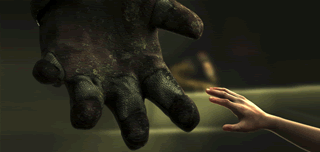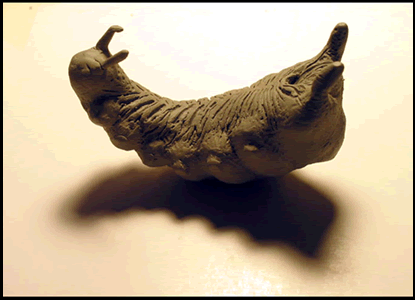
For though I be free from all men,
yet have I made myself servant unto all,
that I might gain the more.
– 1 Corinthians 9:19 (KJV)
Well, it may be the devil or it may be the Lord
But you’re gonna have to serve somebody.
– Bob Dylan
When Bioshock opens, you are floating in the open sea, the sole survivor of a plane crash. Seawater dapples your view of the flaming wreckage all around. And then you realize that you’re in control, trapped among walls of flame, and you must find your way out. The path through those flames is too short and too linear to characterize as a maze, but it does give a spectacular view of the plane exploding before you reach your objective. And therein lies the core challenge facing any interactive fiction that aspires to moral depth: how to offer meaningful choices in a medium that is computationally limited.
Free will is the thematic touchstone of Bioshock. Between the introduction and conclusion, the game takes place entirely in the libertarian haven of Rapture, an underwater city founded by industrial magnate Andrew Ryan. Ryan, avatar and near-anagram of Ayn Rand, espouses a philosophy of pure self-interest untrammeled by ethics and morals. Freed from all social constraints, Rapture’s post-Nazi scientists experiment with stem cells, er, sea slugs, to invent superpowers like telekinesis, electrical skin, and of course hatching angry bees from your arms.
Thus Bioshock offers all the choices any self-respecting FPS would offer when it comes to combat. Ad copy for Bioshock touts these expanded tactical options (“The genetically modified shooter”), but notably, much of the PR around the game highlighted moral decision-making. For while Andrew Ryan provides the intellectual backdrop of Bioshock, the eerily realized Little Sisters provide its moral heart.
And Little Sisters are creepy. They look, talk, sing, and act like five-year-old girls, except with glowing eyes and reverb-effect voices. Oh, and Little Sisters also go around looking for dying bodies to plunge large syringes into. What they pull out – a genetic elixir called “ADAM” – makes them irresistible objects of desire. Only ADAM enables genetic superpowers, and unlike every other resource in the game, its supply is finite. So finding Little Sisters and claiming their precious cargo is quite likely a critical goal through most of the game.
Exactly how you claim that cargo is where the game’s vaunted moral choice resides. (I’ll gloss over the tactical but nontrivial matter of eliminating the Little Sister’s behemoth bodyguard, the iconic Big Daddy). You’ve got two choices: to “harvest” them, which kills them and yields 180 ADAM, or to “rescue” them, which restores them to normal little girls but yields you only 80 ADAM. We’re not talking about a sophisticated moral dilemma here (Zero Punctuation derides the choice as “Mother Theresa or baby-eating”). Still, given that most games heap goodies on players who make the morally “right” choice, the fact that rescuing Little Sisters denies you 100 crucial ADAM points holds some consequence. It’s impossible to max out your genetic powers and get the corresponding Xbox achievement, for example, without killing all of them. All the same, if you “follow the path of the righteous,” every third rescued Little Sister donates 200 ADAM and bonus powers that arguably compensate for the initial up-front sacrifice. And rescuing every Little Sister yields the highest, 100-point Xbox achievement in the whole game. It’s as if the developers, foreseeing a swath of slaughtered virtual children (and corresponding media outrage), tilted the rules in favor of mercy.
Yet a trawl of discussion forums and YouTube screencaps reveals that despite the near-parity of options, many players had no problem harvesting the small genetic freaks. One colleague of mine shrugged when I asked him how he handled the Little Sisters: “I harvested every second one.” This, of course, is the classic problem facing narrative games: the divergence between storyline and game mechanics. I doubt my co-worker would even slap a 6-year-old in real life, not to mention kill them according to some arbitrary formula. (Not many GTA players go around beating up prostitutes for cash, either).
Sea slugs: empathetic nonstarters
Bioshock thus provides a spot lesson on the problem of reading player actions for their moral intent. I think it’s particularly illustrative because it arguably represents the most advanced, conscious effort to induce compassion and empathy in a recent mainstream game title. Lead Designer Ken Levine explained at Boston Postmortem that the Little Sisters / Big Daddies were inspired by ant species with harvester / soldier castes, but non-anthropomorphic harvesters were just not sympathetic enough. So they switched to little girls – an extreme way to crank up the empathy quotient, to be sure:
It’s a shocking, perhaps heart-tugging, sequence. Even so, Atlas (the male voice who advocates harvesting Little Sisters) accurately describes the question we face as players of the game: What claim does this facsimile of a frightened little girl have on our moral conscience? That Bioshock even raises this question represents an important step towards expanding the capacity of interactive media to induce empathy and compassion. That its marketing not only features but oversells its moral dimensions suggests that there’s a real market out there who are hungry for games with depth.
Yet if Bioshock takes its place in the pantheon of game classics, as I believe it should, it would probably be not for its moral depth but rather for its intellectual deconstruction of the concept of free will. The game executes a spectacular reversal at its midpoint that left me shocked and awed. (I won’t spoil it here). It’s just too bad that, having deconstructed the idea of choice, Bioshock gives up on the concept altogether.
The game’s surrender on the question of free will is all the more disappointing given how close Bioshock comes to reconciling its Little Sister heart with its Andrew Ryan mind. The “good” (and syrupy) cinematic conclusion explains your reward for all your sacrifices: a family. It’s a predictable final note (Little Sisters, Big Daddies – get it?) but not, I don’t think, an entirely facile one. For Bioshock’s penultimate chapter requires you to become a Big Daddy and guard a Little Sister against waves of bad guys. For me, this role-reversal was as emotionally rich as the previous twist was intellectually profound, and not just because I found new empathy for these nemeses that I’d frozen / electrocuted / blasted to smithereens with nary a regret
For on top of Garry Schyman’s orchestral score, there’s a second soundtrack to Bioshock: the Little Sisters’ babble that you overhear as you stalk them. Let me be clear here: you spend a significant part of the game stalking little girls and plotting to kill their protectors. And during all that time, you begin to discern the affection a Little Sister has for her guardian – “Mr. Bubbles,” she calls him, in a brilliant bit of writing. “Don’t be a slowpoke, Mr. Bubbles,” she prods when he falls behind; “Unzip him, Mr. B!” she urges when you attack him; “Mr. Bubbles! Please, get up!” she cries when you kill him. And now, suddenly, you are Mr. B. The Little Sister roots for you when the enemies attack (“Tear him into little bits!”). And she’s caring for you when you get hit (“He hurts, he hurts!”).
If you’ve been rescuing Little Sisters all along, it’s not hard to interpret Bioshock’s penultimate sequence as the capstone to a relationship between you and them that’s been forming throughout the game – a Big Daddy finishing school. (There’s even an area called “Proving Grounds”). It led me to ponder: in Rapture, who ends up becoming a Big Daddy? Had my guide through the latter half of the game, Dr. Tenenbaum – creator and “mother” to the Little Sisters – been brainwashing my character to be the ideal Big Daddy candidate? Indeed, had the game developers been brainwashing me using the game? Is Bioshock itself the ultimate empathy-training exercise?
It was a breathtaking possibility that provoked me to go back to an old save point to revisit the moment when I accepted the role Big Daddy. I was dismayed to find that there was no such point. And it is in failing to recognize the importance of offering a decision on this matter, I think, where Bioshock fell short of its full dramatic potential.
Had Bioshock offered Big Daddyhood as a free choice – to choose to indenture yourself to another – it might also have offered a clearer alternative to Andrew Ryan’s vision of Rapture. “A man chooses,” Ryan tells us; “a slave obeys.” Martin Luther would respond that it is in obedience that we find freedom (specifically, obedience to God); Aristotle, without reference to divine will, reminds us that it is accepting our role in community, polis, that we find true human flourishing.
Bioshock posits choice – in games as in real life – as both illusory and meaningful. It’s an idea that the game’s introductory sequence, set in the sea but hemmed in by flame, captures nicely. The fiery walls form not a maze – a puzzle to be solved – but rather a labyrinth – a journey to be walked. Unlike mazes, labyrinths offer only a single path, and the only choice someone walking it has is how to experience it. It’s an idea that medieval pilgrims and mystics understood well: one winds his way through labyrinths not to become lost, but rather to find the way.
by Gene Koo, presented and discussed on 18 December 2007

